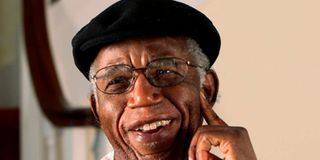Premium
Seeing African generations through the literary lens

The late Chinua Achebe, author of "Things Fall Apart" and "The Voter".
What you need to know:
- The literary world has the capability to frighten us into better behaviour.
- Africans have gone through momentous historical upheavals.
One of the greatest strengths of literary works is that they give the most nuanced understanding of the fears, hopes and aspirations of a people.
Unlike history, which gives sometimes a droning account of a people’s experience – from an impassioned perspective often dictated by the victors of our various cultural battles – a work of poetry, a collection of short stories or a novel gives us a poignant peek into the nooks and crevices of the minds and hearts of the people.
It paints for us a picture that makes us relate to the smells, the sights, the joys and the horrors that line the path of human existence.
The literary world has the capability to change us; to frighten us into better behaviour.
Indeed, as one of my teachers used to say, if you have read Ghanaian author Ayi Kwei Armah’s The Beautiful Ones are Not Yet Born, you would avoid like the plague touching the banisters on either side of the staircases you use at your place of work or in public places.
In an extended metaphor meant to depict corruption in the setting of the book, the author traces the places the many fingers that touch that same banister pass through, including parts of the human anatomy I’m hesitant to reproduce here.
Suffice it to say that given the weight of the vicissitudes of history that humanity has had to contend with, no other medium, with the possible exception of good old journalism, has the capacity to capture the essence of a people’s existence better than fiction.
Of course, memoirs, autobiographies and biographies fit in rather snuggly here, but in my world, these too are all half fiction.
Many are the times someone sitting down to write a “bare-all” book tells the ghost writer, “I’d rather than not have that part in my book”, or “that is true but I am not writing my book to expose my past misdeeds”.
If we did not have the works of Toni Morrison, Richard Wright, Frederick Douglass, Harold Sonny Ladoo, Dennis Scott, Langston Hughes, Claude Mackay, George Lamming, Lorraine Hansberry, Kamau Brathwaite, and others, we would have next-to-zero understanding of the horrors of what has come to be known as “middle passage”.
The Harlem Rennaisance of the 1920s and 30s and the Caribbean literary outpouring succinctly immortalised memories of the tale of woe that was the shipment of slaves from Africa to work on cotton and sugarcane plantations in West indies and the Americas.
Indeed, if we did not have the works of Peter Abrahams, Nadine Gordimer, Alex la Guma and others, those of us with no relatives in South Africa would not have felt – in the bone – the pain that apartheid wrought on that country.
And if Albert Chinua Achebe had not been angered to no end by books such as Joseph Conrad’s infamous The Heart of Darkness, which goaded him to write his first novel, we would not have known the clash of traditions that marked the arrival of British colonialists in West Africa.
Achebe wanted to dispel the notion that the African way of life was not “little more than a series pagan rites.”
Of course I’m not a cultural purist. I believe in the continuous cross-pollination of cultures and ideas, as we are all one people.
So, for me the argument has never been that autochthonous African cultures should have been carried wholesale into the future. No, societies should always reach out to others as they evolve and regenerate.
To that end, the written world does a wonderful job of deconstructing backward attitudes – Francis Bacon called them the idols of the mind – that impede cross-cultural ties.
So, Achebe, writing in simple English, wanted to create a literary world that would pass the message that there was a whole world of values and mores in what the colonialist saw as “a series of pagan rites”.
It is due to this ability of the written word to deconstruct unhelpful biases that I think every generation should be supported to produce its own works of fiction and thus give us a peek into its collective mind.
For, what is fiction but distilled reality! In Decolonising the Mind, Ngugi tells us that his novel, Devil on the Cross, was not meant to be a book on demons.
Rather, the metaphor of the cross was the culmination of his mental search for a fitting imagery to depict the socio-cultural larceny that the postcolonial African world had descended into.
Kenyans, and by extension Africans, have gone through momentous historical upheavals. Just like others before us captured the feeling of their time, I am eager to read good works of fiction on climate change, the Covid-19 pandemic and other vicissitudes of history that we have gone through as a people.
I would love to “understand” Gen-Zs, who have been telling us old geezers that we don’t understand them - through their own poetry, novels, short stories, shorts, short shorts or whatever literary products they innovate in their time.
This will not only give future generations and people in other places a window into Gen-Z’s experiences, fears, hopes and aspirations, it will also make humanity better by fostering an understanding based on which we relate better with each other and with others.
The writer is a publishing and editorial consultant; [email protected]


